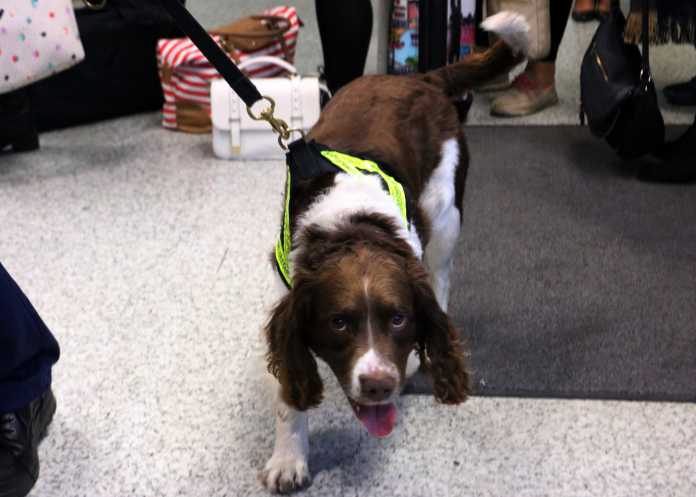

Picture: Brendan Gleeson
Ollie the spaniel is a familiar figure to frequent travellers in and out of Shannon Airport as he follows his nose to help stop illegal substances reaching Ireland’s streets. This week Kathy Masterson meets Ollie and his handler Adrian to find out more about their work and the life of a sniffer dog.
WHEN I meet Ollie, the Shannon Airport drug detection dog, he is lounging in his bed enjoying some down time before the arrival of the next flight.
A five-year-old springer spaniel (his birthday is Halloween, so I’m told), Ollie has sniffed out 22.5 kgs of drugs so far this year, with a value of €310,000.
He has been trained to detect the scent of cannabis herb, cannabis resin, heroin, cocaine and amphetamines.
A second springer spaniel, Harvey, is trained to search for tobacco and cash, as he can detect the scent of the ink used on bank notes.
So far in 2015, Harvey has assisted in the seizure of more than 300,000 cigarettes at the airport, valued at approximately €147,000.
Ollie and his handler Adrian McMahon’s work mainly involves screening passengers, luggage, cargo and aircraft at Shannon Airport; they also cover the post office and search ships arriving into Foynes.
I ask Adrian what the training process for a drug detection dog involves.
“Every dog is different, but on average they do about six months of intensive training. After that the handler is introduced to the dog and you do about two months training with the dog and building a relationship with the dog.”
For Ollie, his work is a series of games that end in a fun reward – his beloved tennis ball. When Ollie ‘knocks’ on a bag, that is when he pats it with his paw and lies down, he can enjoy a game of fetch with Adrian.
“A search dog is no good unless he’s willing to retrieve a ball; we call that the drive for a ball. Ollie has it; he would fetch a ball all day until he’s burnt out. The dogs are trained by a company in the UK. As with all search dogs, the training is repetitive. First they’re introduced into a room and there will be a scent of drugs on a ball, so the dog will have to find the ball to get used to finding the scent. Then the ball is removed and the scent is put in the room, when he indicates he’s found the scent, he gets the ball.
“We also do Continuous Training (CT) on a daily basis to keep the dog up to speed. If he was working every day and not getting his reward it would turn him off and he’d lose interest. If he doesn’t genuinely knock on a bag, we have a bag that has a scent of drugs so he can knock on that and get his reward,” explains Adrian.
“I have to walk him, feed him, look after him – it’s just like having another child. He needs a lot of exercise, he could go all day.”
I ask if Ollie is like any other pet dog when he is not working.
“Not totally. You can’t just play with him like a normal dog. I play with him when he detects drugs and he knocks on a bag. If I just let the kids play with him he won’t associate the reward of the ball with the finding of drugs.”
While Adrian and Ollie prepare to welcome the next group of passengers, Joe Connolly, higher executive officer of customs in Shannon, tells me a bit more about the work of his department.
“Our biggest find this year was about four and a half kilos of cocaine, so that was quite a significant seizure. On a pro rata basis, we carry out the same amount of seizures, if not more, than Dublin Airport. Although they only work at the airport, we work at the post office and in Foynes Estuary, where you would get about 700 vessels a year, a lot of them from high-risk countries.”
High-risk regions in terms of drug smuggling include West Africa, South and Central America, and the southern states of the USA such as Florida, Joe tells me.
“Every day is different, and one phone call could change your week. That’s part of the attraction of it. You could be doing the airport in the morning, Foynes in the afternoon and the post office at night. There is no routine, but we do have a plan and we try to stick to that to make sure we’re hitting everywhere,” reveals Joe.
“We find illegal cigarettes more so than drugs. People tend to distance themselves from drugs, they prefer to post them rather than carry them in themselves.”
Joe reveals that finding drugs in the post is a common occurrence, and the team have also uncovered some more unusual items, including one of the largest rhino horn finds in Europe when eight rhino horns were seized at the airport.
“Once a sheepskin came in the post from China, it was covered in maggots. We had to hand that over to the Department of Agriculture to be destroyed,” added Adrian.
The busy mid-morning flight from Stansted arrives and soon the passport control and baggage areas become a hive of activity.
As the passengers line up to have their passports checked, Ollie springs into action – no doubt with his mind on his tennis ball.
A few dog lovers on the plane smile and admire the spaniel, while a couple of others look a little nervous.
Ollie’s tail is wagging furiously as he walks up and down the queue of passengers, sniffing each person and their hand luggage, and it’s clear he enjoys his work.
I had been secretly hoping to witness a major drugs seizure and bag myself a scoop, but to my disappointment, there is nothing among this group of 
When the last person is screened, Joe, posing as a passenger, joins the line carrying a sports holdall containing what the customs team refer to as ‘a soak’ – a facecloth soaked in the scent of cannabis.
Ollie catches the scent straightaway; he pats the bag with his paw and lies still on the ground in front of Joe. Finally he gets his ball!
“We get the passengers to line up in single file. Ollie will run past all the passengers to screen them and if he knocks on someone’s bag we will take them aside to search them and search their bag. If drugs are found, then we will pass it on to the Gardaí and that person will be cautioned, arrested and prosecuted. We’re not delaying the passengers at all; they’re waiting to go through immigration anyway so it’s a great opportunity to screen people with the dog.” reveals Adrian.
Joe added: “Back in October we found a man who had ten to 12 deals of cocaine on him. He was arrested and that case is before the courts at the moment. The dog will pick up on small amounts for personal consumption, such as a couple of grams. Why people try and bring it in with them I’ll never know.
“We also get people trying to bring in bigger quantities; a lot of those people would be in very poor circumstances. They might owe a debt and their family has been threatened, but our job is just to detect the drugs. It’s up to the courts then to prosecute them and to decide if there are any mitigating circumstances.
“Sometimes if drugs are detected in one country we will control them through, so we could get a call from Germany or somewhere to say they’ve detected drugs, but they will let them go through. One of our aims is to get the product and the second is to get a prosecution.”
Next we hurry to the cargo area behind the scenes where baggage handlers are unloading luggage from the aircraft onto the conveyor belt that takes the bags upstairs to the waiting passengers.
Ollie runs up and down the conveyor belt having a good sniff of each bag. But once again I’m disappointed as all of the bags are clear.
The holdall is produced again; Ollie pounces on it and lies flat, and gets to play with his ball once more.
“It’s like telling a child ‘I promise I’ll give you a bag of sweets if you do this,’” says Adrian, “I’ll have a bit of a play with him now and that’s his fun time, that’s what it’s all about.”
Ollie could continue to work for another three years or so, if he stays at his current form.
When their careers are over, the Revenue’s sniffer dogs will retire as pets; they will usually live out the rest of their days at home with their handlers.
According to Adrian, the relationship between dog and handler is hugely important.
“You have to be able to read the dog. Sometimes the drugs could be vacuum packed, and he only gets a hint of a scent so he doesn’t knock on it because he isn’t sure, but I’ll know by the way he looks back at me that he’s caught a slight scent.”
For Adrian, becoming a customs dog handler has fulfilled a childhood dream of working with animals, he also enjoys the unpredictable nature of the job.
“I always wanted to work with animals; when I was younger I used to help out on my uncle’s farm, and then I used to spend my summers working for a vet.
“We never know what’s going to happen each day or what people we’re going to meet. You get great job satisfaction when you see someone being whisked away in a squad car and you know that that’s another drug courier being taken away.”



